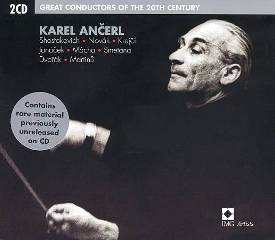01.Great Conductors of the 20th Century - Karel Ancerl
01.Great Conductors of the 20th Century - Karel Ancerl

CD1 1 Festive Overture, Op.96: Allegretto-Presto 2 In The Tatra Mountains, Op.26: Symphonic Poem 3 Serenade for Orchestra: I. Allegro See All 2 4 Serenade For Orchestra: II. Andante Quasi Allegretto 5 Serenade For Orchestra: III. Presto See All 2 6 Taras Bulba:Rhapsody For Orchestra, After Gogol: The Death Of Andrei 7 Taras Bulba:Rhapsody For Orchestra, After Gogol: The Death Of Ostap 8 Taras Bulba:Rhapsody For Orchestra, After Gogol: The Prophecy And Death Of Tara Bulba 9 Variations On A Theme By And On The Death Of Jan Rychlik CD2 1 Cycle Of Symphonic Poems 'My Fatherland' (Ma Vlast): The Moldau (Vltava): Allegro Comodo Non Agitato; L'istesso Tempo Ma Moderato; Listesso Tempo; Tempo I; Piu Moto 2 Symphony No. 8 In G Major, Op.88: I. Allegro Con Brio 3 Symphony No. 8 In G Major, Op.88: II. Adagio 4 Symphony No. 8 In G Major, Op.88: III. Allegretto Grazioso 5 Symphony No. 8 In G Major, Op.88: IV. Allegro Ma Non Troppo 6 Symphony No.5: I. Adagio 7 Symphony No.5: II. Larghetto 8 Symphony No.5: III. Lento 9 Slavonic Dance In G Minor Op.46 No.8: Presto Czech Philharmonic Orchestra, Vienna Symphony Orchestra, Royal Concertgebouw Orchestra, Toronto Symphony Orchestra Karel Ancerl – conductor
The volume devoted to Czech conductor Karel Ancerl is one of the best of EMI's variable Great Conductors series. With the exception of Shostakovich's Festive Overture (not one of his indispensable works), the focus is on Czech composers, thus the set doesn't even attempt to sample the full range of Ancerl's wide musical sympathies. But he was such a superb conductor of Czech music that it's hard to get too upset about the skewed repertoire, especially when we get magnificent performances of neglected music that deserves wider hearing, such as Otmar Mácha's Variations on a theme by and on the death of Jan Rychlik.
Mácha used a flute piece by his friend Rychlik as the basis for a work of originality and power. The poetic opening soon gives way to mounting intensity that reaches a climax at the midpoint, with a Till Eulenspiegel-like flute cowed by raucous trombones and orchestral explosions. After another orchestral climax featuring steadily pounding timpani comes silence, followed by the flute's feeble pipings, a picture of spiritual devastation if ever there was one. Considerably lower on the scale of music we in the West have missed out on is Iša Krejcí's Serenade for Orchestra, an attractive, light, three-movement work with bouncy outer movements and a pretty Andante featuring some lovely string melodies.
More familiar is Viteslav Novák's tone poem In the Tatra Mountains, heard in the first recording Ancerl made with the Czech Philharmonic he led for 18 years. It's full of atmosphere and gorgeous scene-painting, especially in the woodwinds, although the dry, constricted 1950 engineering robs the climaxes of their full impact. Ancerl's intensity and wide dynamics help Janácek's Taras Bulba make a stirring impression, with eloquent winds, brawny brass, and white-hot strings vividly captured in wide-ranging 1961 stereo sound.
The second disc focuses on Ancerl's international career, opening with Smetana's Vltava (The Moldau) in a Vienna performance that downplays its anthem-like aspects and stresses lyricism. A live Dvorák Eighth Symphony from 1970 with the Concertgebouw is nothing short of sensational--brilliantly played, each movement characterized without idiosyncracies, brimming with rhythmic life that keeps the music moving and lends it sparkle. (Ancerl fans already may have this on Volume 2 of Tahra's "Edition Karel Ancerl" series.)
Another live performance, Martinu's Fifth Symphony with the Toronto Symphony in 1971, is on a level similar to the Dvorák; Ancerl's rhythmic alertness and care with balances lends transparency to a busy score that sometimes can sound too dense. There's an Old World gentleness about Ancerl's caressing Larghetto that's captivating, and while you can imagine the final Allegro played with a touch more animal vigor, it's still quite exciting here. A stomping Dvorák Slavonic Dance makes a stirring close to a well-transferred, generously timed (155 minutes) set of brilliant performances. --Dan Davis, ClassicsToday.com
download:
